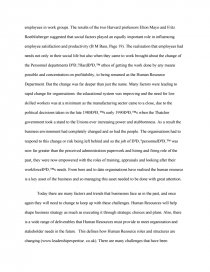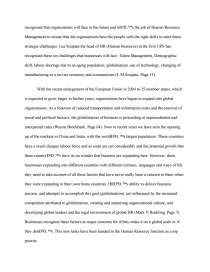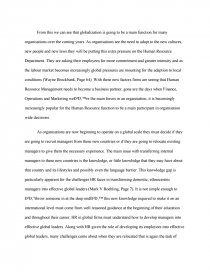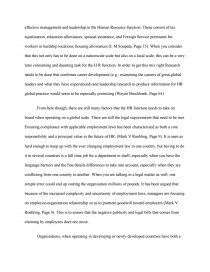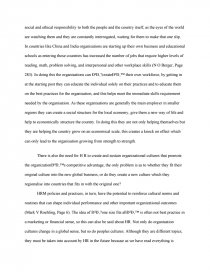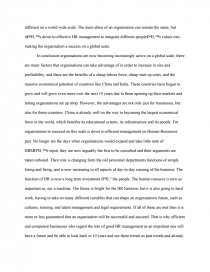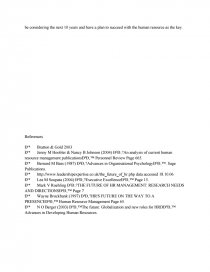Hrm Central Focus
Essay by 24 • July 3, 2011 • 2,384 Words (10 Pages) • 1,152 Views
“During its 125 year history, the core concern of the people management function has varied from employee welfare, to industrial relations, to manpower planning and more recently organisational effectiveness.
What do you think should be the central focus for people managers and the HR function over the coming 10 years and why? How would this change the nature of HR activity in contemporary organisations?”
Human Resource Management is a strategic approach to managing employment relations which emphasizes that leveraging people’s capabilities is critical to achieving sustainable competitive advantage, this being achieved through a distinctive set of integrated employment policies, programmes and practices (Bratton & Gold, Page 7). Human resource management has grown and evolved as a discipline since the years following the First World War. Personnel management began in this period as a fusion of two separate industrial movements: scientific management and welfare work. Personnel management has evolved from the goals of eliminating waste, inefficiency, and human suffering, to human resource management, focusing on the organizational perspective and performance enhancement (J M Hoobler & N B Johnson, Page 655). It was all due to the industrial revolution that the need to control and use your human resource to its full potential came about.
Around the 1900’s an era emerged that became well known for its explicit emphasis on man-machine efficiency to increase productivity, In accordance with the scientific management philosophy the approach was to engineer the job and then fit the employee to it. (K M Rowland & G R Ferris, Page 4). From this led to the “Human Relations” era which gave considerable emphasis to improving social relationships between supervisors and employees in work groups. The results of the two Harvard professors Elton Mayo and Fritz Roethlisberger suggested that social factors played an equally important role in influencing employee satisfaction and productivity (B M Bass, Page 19). The realisation that employees had needs not only in their social life but also when they came to work brought about the change of the Personnel departments вЂ?Hard’ ethos of getting the work done by any means possible and concentration on profitability, to being renamed as the Human Resource Department. But the change was far deeper than just the name. Many factors were leading to rapid change for organisations: the educational system was improving and the need for low skilled workers was at a minimum as the manufacturing sector came to a close, due to the political decisions taken in the late 1980’s early 1990’s when the Thatcher government took a stand to the Unions ever increasing power and stubbornness. As a result the business environment had completely changed and so had the people. The organisations had to respond to this change or risk being left behind and so the job of вЂ?personnel’ was now far greater than the perceived administration paperwork and hiring and firing role of the past, they were now empowered with the roles of training, appraisals and looking after their workforce’s needs. From here and to date organisations have realised the human resource is a key asset of the business and so managing this asset needed to be done with great attention.
Today there are many factors and trends that businesses face as in the past, and once again they will need to change to keep up with these challenges. Human Resources will help shape business strategy as much as executing it through strategic choices and plans. Also, there is a wide range of deliverables that Human Resources must provide to meet organization and stakeholder needs in the future. This defines how Human Resource roles and structures are changing (www.leadershipexpertise. co.uk). There are many challenges that have been recognised that organisations will face in the future and it’s the job of Human Resource Management to ensure that the organisations have the people with the right skills to meet these strategic challenges. Lea Soupata the head of HR (Human Resource) at the firm UPS has recognised these six challenges that businesses will face: Talent Management, Demographic shift, labour shortage due to an aging population, globalisation, use of technology, changing of manufacturing to a service economy and consumerism (L M Soupata, Page 15).
With the recent enlargement of the European Union in 2004 to 25 member states, which is expected to grow larger in further years, organisations have begun to expand into global organisations. As a function of reduced transportation and information costs and the removal of social and political barriers, the globalisation of business is proceeding at unprecedented and unexpected rates (Wayne Brockbank, Page 64). Now in recent years we have seen the opening up of the markets in China and India, with the world’s largest population. These countries have a much cheaper labour force and so costs are cut considerably and the potential growth that these country’s have its no wonder that business are expanding here. However, these businesses expanding into different countries with different cultures, languages and ways of life they need to take account of all these factors that have never really been a concern to them when they were expanding in their own home countries. HR’s ability to deliver business success, and attempts to accomplish this goal (globalisation), are influenced by the increased competition attributed to globalization, creating and sustaining organizational culture, and developing global leaders and the legal environment of global HR (Mark V Roehling, Page 7). Businesses recognise these factors as major concerns for if they make it on a global scale or if they don’t. This new tasks have been handed to the Human Resource function as a top priority.
From this we can see that globalization is going to be a main function for many organisations over the coming years. As organisations see the need to adapt to the new cultures, new people and new laws they will be putting this extra pressure on the Human Resource Department. They are asking their employees for more commitment and greater intensity and as the labour market becomes increasingly global pressures are mounting for the adaption to local conditions (Wayne Brockbank, Page 64). With these new factors firms are seeing that Human Resource Management needs to become a business partner, gone are the days when Finance, Operations and Marketing we’re the main forces in an organisation, it is becomingly increasingly popular for the Human Resource function to be a main participant in organisation wide decisions.
...
...

